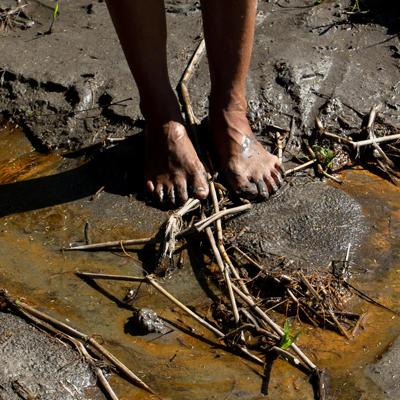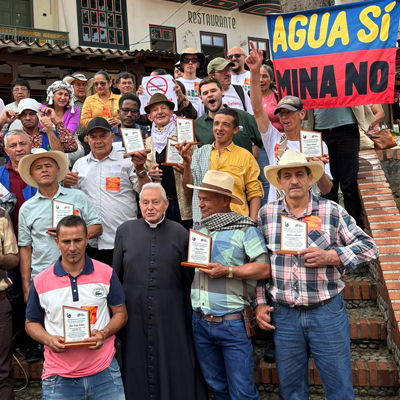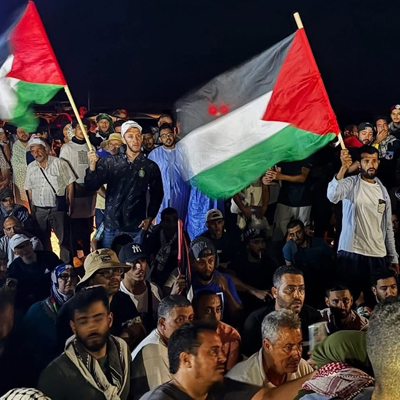BLACK OVER GREEN: OIL SPILLS IN ECUADOR
Pablo Fajardo from UDAPT: “In the Ecuadorian Amazon there are over 200 oil spills per year”

On 7 April, 2020, the foundation and pipelines of the Trans-Ecuadorian Oil Pipeline System (SOTE) and the Heavy Oils Pipeline (OCP) collapsed, causing a huge oil spill on the waters of the Coca River, which rapidly reached the Napo River. Both rivers are part of the Amazonas River Basin, which flows into the Atlantic Ocean. This polluted the water, land, air, plants and animals and directly impacted communities of the area, destroying their livelihoods.
Two years later, on 28 January, 2022, the OCP collapsed again, causing a spill that reached the Piedra Fina, Quijos, Coca and Napo Rivers, to the North of the Ecuadorian Amazon, polluting the Cayambe-Coca National Park, a protected area.
These two environmental disasters made the news, but they are just two in an endless list. Oil spills are taking place constantly, although not all of them are covered by the media.
From 2015 to 2021 there were approximately 900 oil spills in Ecuador, according to official data from the Ecuadorian Environment Ministry. In 2003, 8000 oil barrels were spilled in Papallacta lagoon; in 2006, 650 oil barrels reached the Tiuputini River; in 2008, the Amazon city of Baeza was affected by 8000 oil barrels more; in 2010, the Teaone River was tainted with 1300 oil barrels; in 2013, 5000 oil barrels were spilled on Wínchele; and a year later, 2000 oil barrels reached the Parahuaico River. And of course we cannot forget the emblematic case of Chevron in the country.
Real World Radio interviewed lawyer Pablo Fajardo, member of the Union of People Affected by Texaco´s Oil Operations (UDAPT), and we asked him about the latest spills, the impacts of the advance of oil corporations, the responsibility of the State, the impunity of transnational companies and the struggle for a change in the model that enables life for all.
The OCP was built between 2002 and 2003, when Ecuador was led by President Gustavo Noboa. Back then, the discourses promised that oil production would be doubled, boosting the economy and ending poverty in Ecuador, said Fajardo. But “18 years have passed since then, and the economy is worse than ever,” and the discourse remains the same.
The area where the OCP and SOTE are located is heavily eroding, a natural process whereby the banks of rivers collapse. “Oil companies and the Ecuadorian State are not taking any precaution,” commented the lawyer, highlighting that indigenous communities are who suffer damages and consequences the most: “128 Kichwa indigenous communities live in the Ecuadorian side of the river. For them, the river is their main source of food, recreation, communications and access, the river is life for Indigenous Peoples.”
Little prevention, no reparation, heavy repetition
“In the Ecuadorian Amazon there are 3 to 4 oil spills per week. In a year there are over 200 oil spills,” said Fajardo and he explained that “Ecuador has no prevention or reparation policies or mechanisms to avoid the non-repetition of environmental disasters.” The lawyer and activist believes this is a sign of the “direct complicity of the Ecuadorian government with public or private oil companies.”
The ultimate protagonist in the latest environmental disasters in the Ecuadorian Amazon has been the OCP. This private company has been irresponsibly operating in the country and it transports oil to several transnationals, including French corporation Perenco, Spanish Repsol and the national Petroecuador, among other Canadian and Chinese corporations.
“Public, private, national or transnational oil corporations, and the Ecuadorian State, have been progressively decimating the life and subsistence economy of Indigenous Peoples, they have been destroying their traditional ways of living and creating huge necessities. Once these necessities are created, the companies come to offer them small jobs in order to buy impunity,” assessed the UDAPT member.
Fajardo believes that the evasion of responsibilities is clear. “It is a criminal and intentional act by the Ecuadorian State and transnational corporations, a progressive, systematic and increasingly cruel act against these indigenous and also peasant communities.”
UDAPT offers legal solutions to communities, they carry out administrative actions, and they visibilise and procure resources for the peoples affected. Pablo Fajardo recognised that in the legal sphere it is very difficult to move forward, due to the “corporate capture of the judicial system.” However, at international level, he highlighted that “a Binding Treaty would open up the space for the people to have access to justice against corporate crimes.”
Late or null responses, transferring responsibility from one company to the next, lies in the media and the complicity of the State are just some of the impunity tactics used by transnationals, which, according to Fajardo, can be transformed with resistance of communities and the strength of popular mobilisation.
Life is priceless, but the perspectives sometimes are deceiving. The activist believes this is what happens with the oil business: “they look at it in economic terms, not in terms of life, dignity and sovereignty.”
At the end of the interview with RWR, the lawyer talked about the potential actions and transformations in legal, social, political and cultural terms to address this issue.
Among them he highlighted internationalist solidarity: “What happens in Ecuador is not an isolated event. It happens in many areas of Latin America, Africa and Asia, and it is good that we have the knowledge and capacity to understand and build solidarity networks at global level in order to realise that the oil extractive industry is perverse and criminal.”





